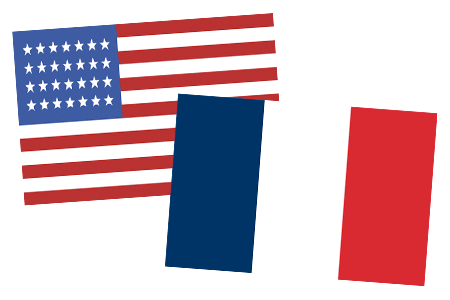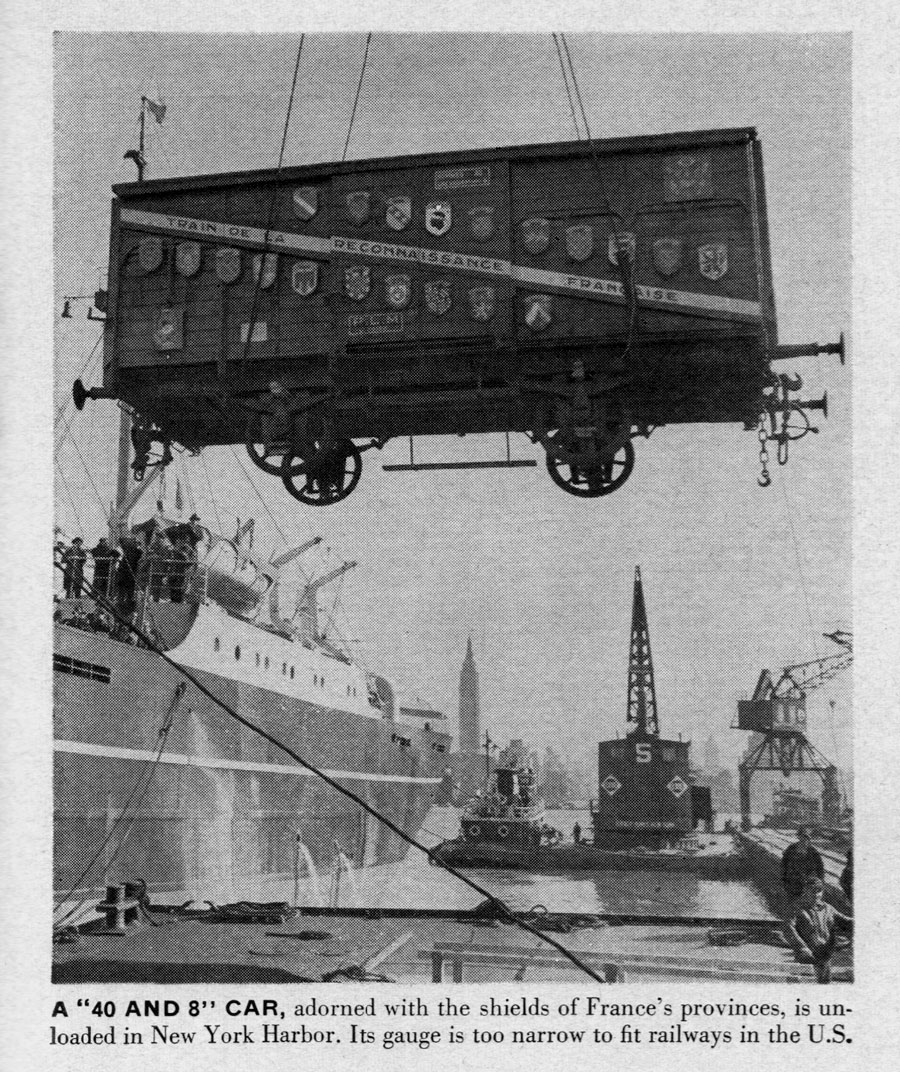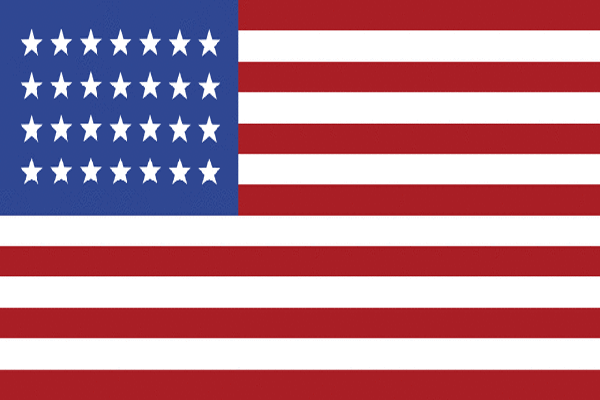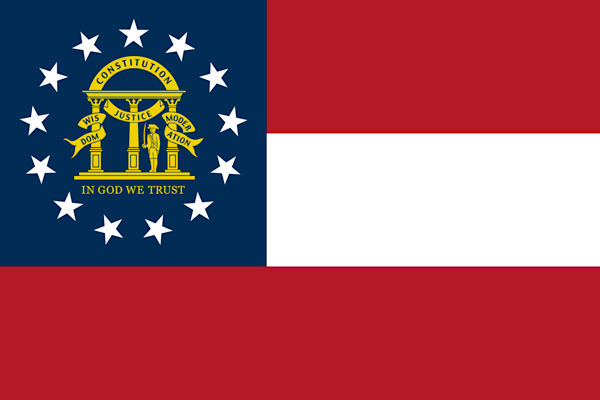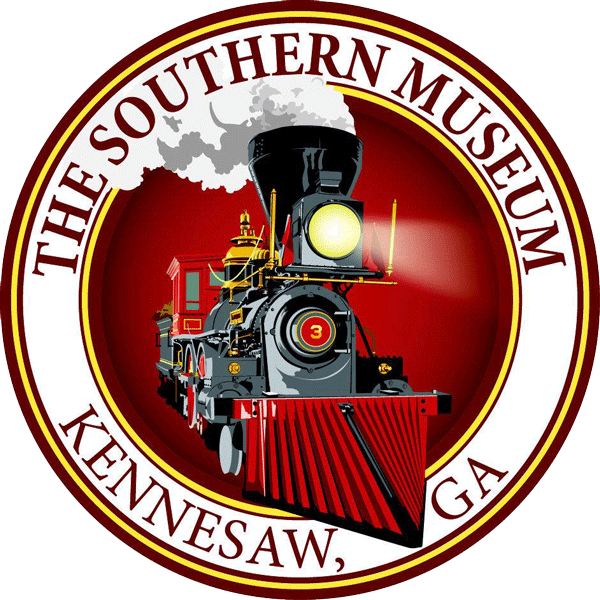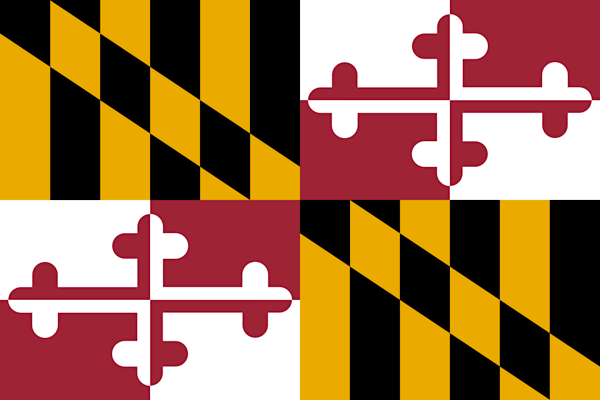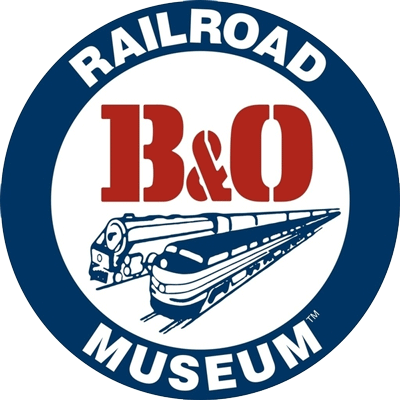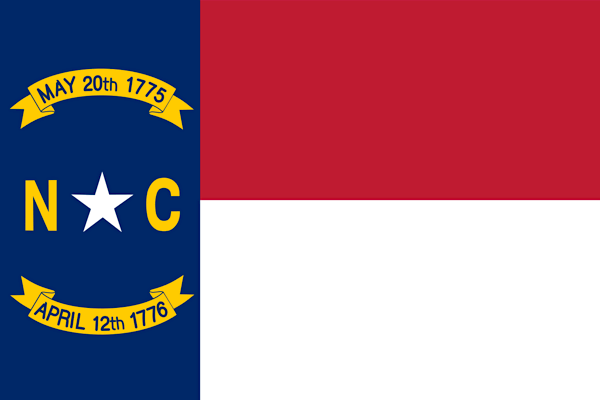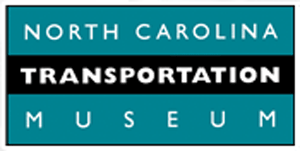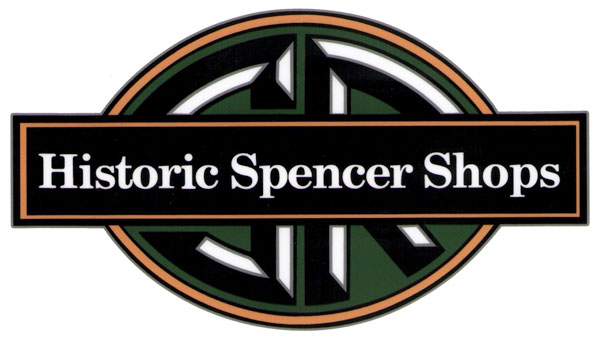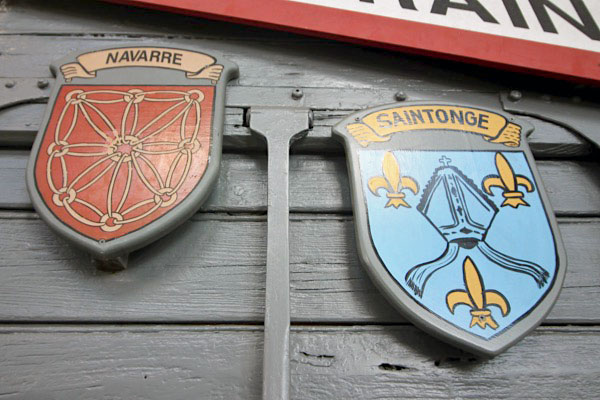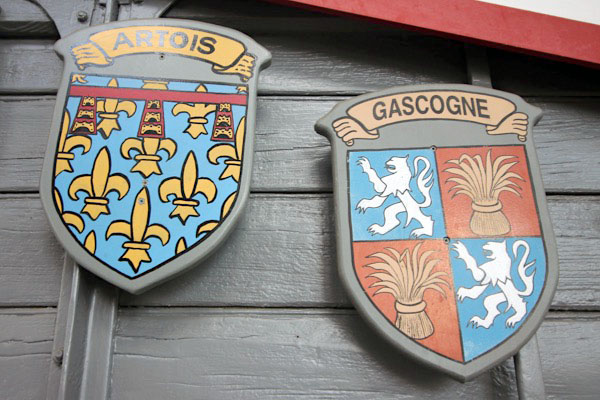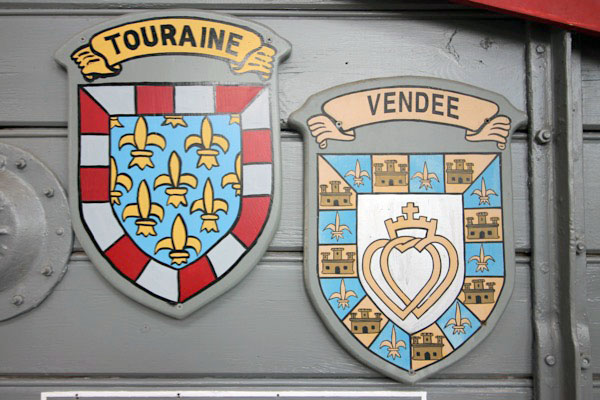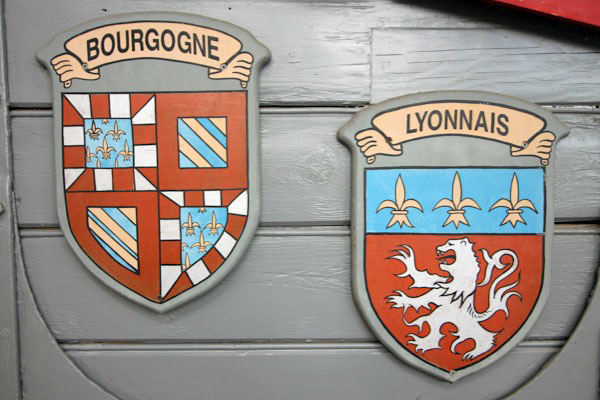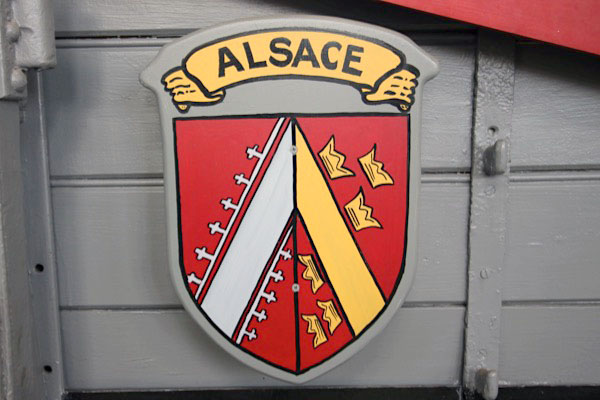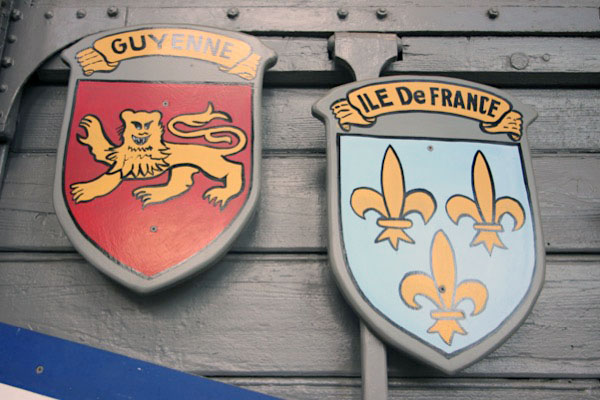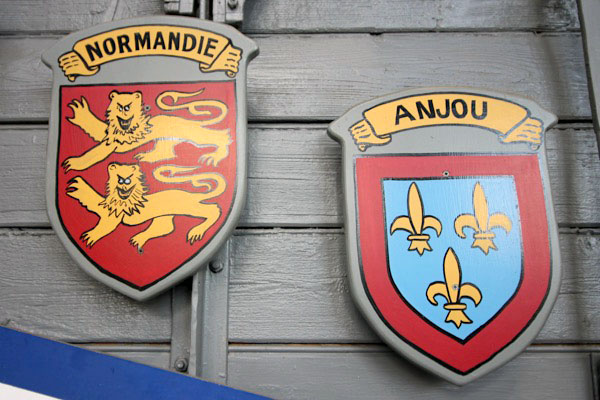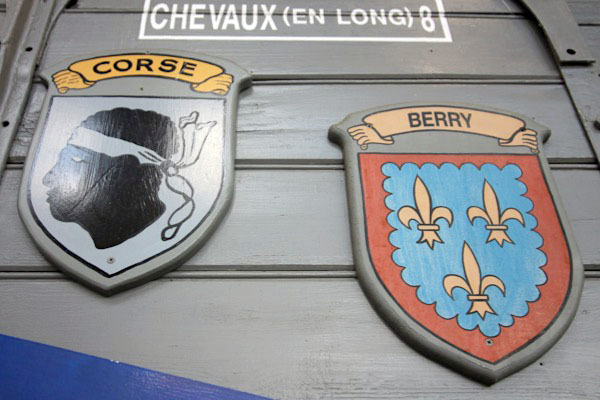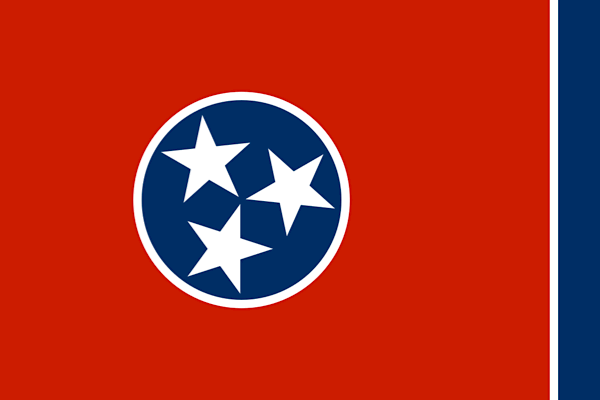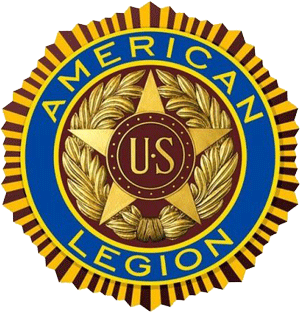
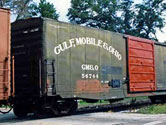
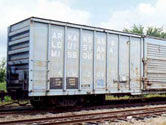
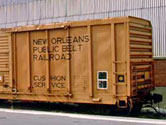
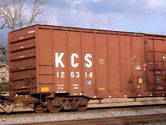
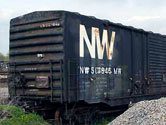
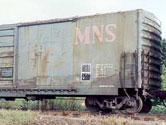
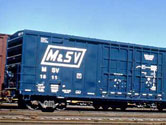
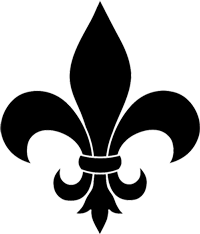 Featured Collection
Featured CollectionMerci Boxcars
France says "Thank You" to Americans
In February of 1949, a train of 49 French boxcars arrived by ship in New York harbor. Each wooden boxcar contained hundreds of gifts from French citizens, symbols of gratitude for the United States military and humanitarian efforts during and after World War II. One car was delivered to each American state, and many still exist in state capitals and museums.
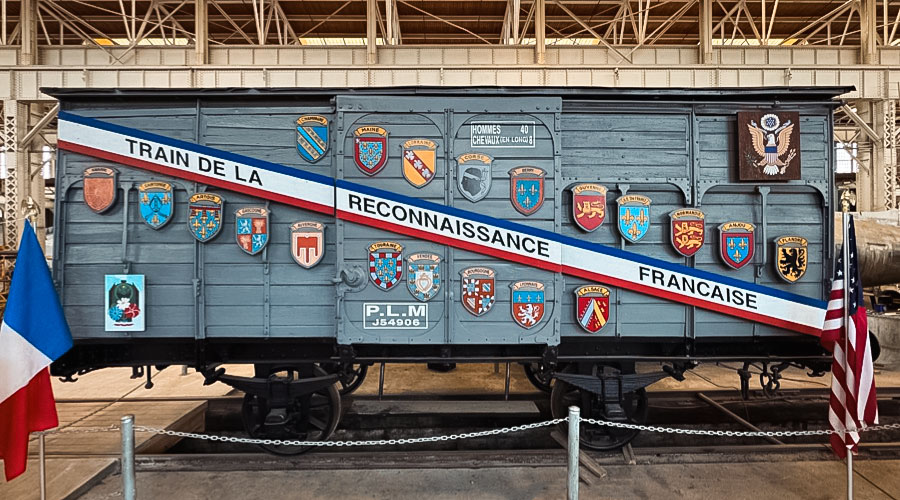
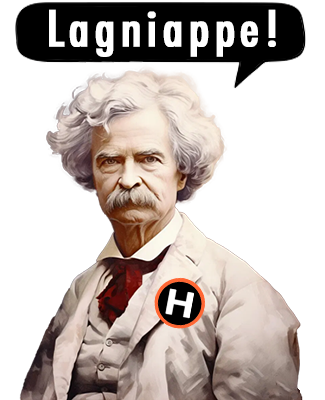
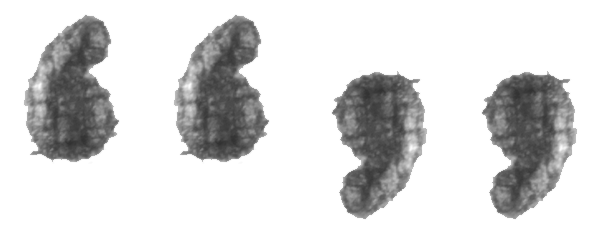
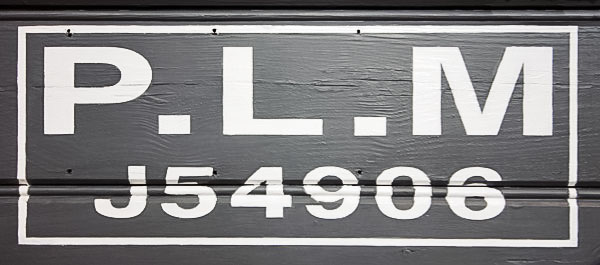
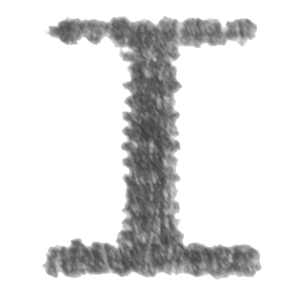 n early 1949 there were thousands of World War 1 veterans and millions of WW2 veterans still living who had memories of spending as much as a week being transported to, or from, the battlefronts of the wars in that exact same type of boxcar. There were no seats, no windows, no toilets, and no sleeping or dining accommodations. Each man and his 39 traveling companions had barely enough space to sit down and they had to fit their bodies in rows to have enough room to lie down for sleep. Most of the veterans that survived the war had memories of those final rides and conversations with buddies, including some who were killed and never made it back to the U.S.A. Those surviving veterans decided to make the little gift boxcars memorials to the those lost buddies and the sacrifices that they made to save the world from the tyranny of Nazism. Thus it is that, for almost 75 years, they have volunteered to keep the little antique boxcars repaired and honorably displayed in an effort to memorialize all those who had given their all for the freedom of people everywhere in the world. We think that all of those heroes should continue to be honored by the continued preservation of these humble symbols of their sacrifices.
n early 1949 there were thousands of World War 1 veterans and millions of WW2 veterans still living who had memories of spending as much as a week being transported to, or from, the battlefronts of the wars in that exact same type of boxcar. There were no seats, no windows, no toilets, and no sleeping or dining accommodations. Each man and his 39 traveling companions had barely enough space to sit down and they had to fit their bodies in rows to have enough room to lie down for sleep. Most of the veterans that survived the war had memories of those final rides and conversations with buddies, including some who were killed and never made it back to the U.S.A. Those surviving veterans decided to make the little gift boxcars memorials to the those lost buddies and the sacrifices that they made to save the world from the tyranny of Nazism. Thus it is that, for almost 75 years, they have volunteered to keep the little antique boxcars repaired and honorably displayed in an effort to memorialize all those who had given their all for the freedom of people everywhere in the world. We think that all of those heroes should continue to be honored by the continued preservation of these humble symbols of their sacrifices.
Earl Bennett Sr. / MerciTrain.org / image RWH

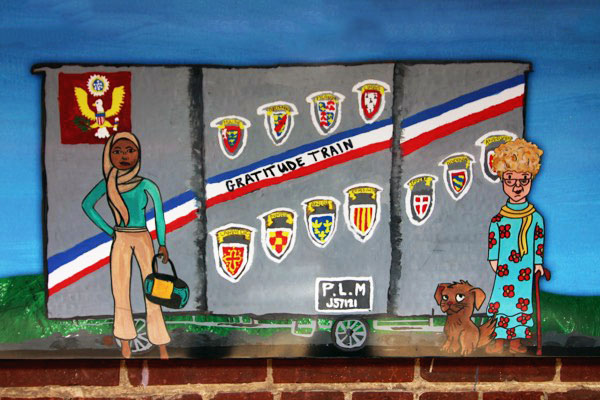
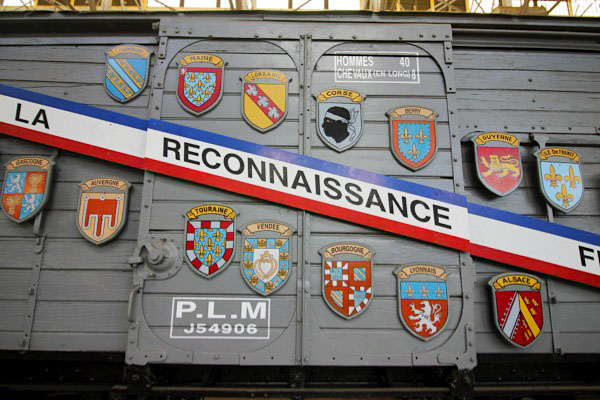
Spencer, NC / Apr 2025 / RWH

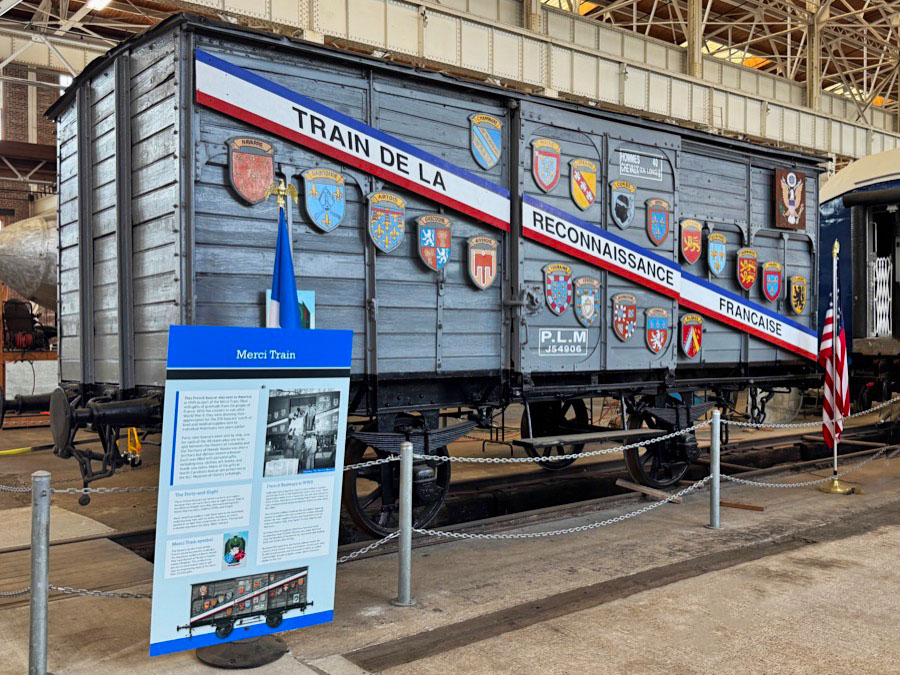
Spencer, NC / Apr 2025 / RWH

Apr 2025 / RWH
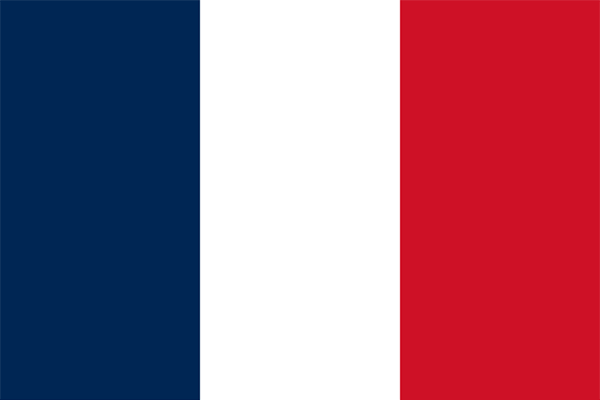
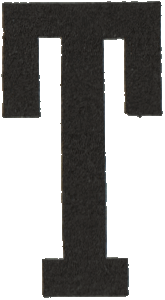 he French “Merci Train,” also known as the “Gratitude Train,” was a heartfelt gesture of thanks from the people of France to the United States in 1949. Following World War II, in response to the American-led 1947 “Friendship Train” that had sent food and supplies to a devastated Europe, the French organized a reciprocal effort. Citizens across France contributed gifts — ranging from artwork and handmade items to personal mementos — to fill 49 boxcars, one for each U.S. state at the time (plus one shared by Washington, DC, and the then-territory of Hawaii). These wooden boxcars, known as “40 and 8s” for their World War I-era military designation of carrying 40 men or 8 horses, were shipped aboard the freighter Magellan and arrived in New York Harbor in February 1949. The Merci Train symbolized Franco-American friendship and postwar solidarity, and most of the boxcars and their contents are still preserved in museums and memorials across the United States today.
he French “Merci Train,” also known as the “Gratitude Train,” was a heartfelt gesture of thanks from the people of France to the United States in 1949. Following World War II, in response to the American-led 1947 “Friendship Train” that had sent food and supplies to a devastated Europe, the French organized a reciprocal effort. Citizens across France contributed gifts — ranging from artwork and handmade items to personal mementos — to fill 49 boxcars, one for each U.S. state at the time (plus one shared by Washington, DC, and the then-territory of Hawaii). These wooden boxcars, known as “40 and 8s” for their World War I-era military designation of carrying 40 men or 8 horses, were shipped aboard the freighter Magellan and arrived in New York Harbor in February 1949. The Merci Train symbolized Franco-American friendship and postwar solidarity, and most of the boxcars and their contents are still preserved in museums and memorials across the United States today.


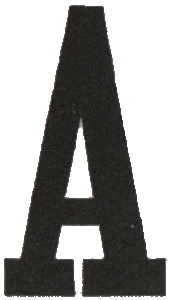 fter the war, efforts were made by the American people to assist areas of Europe that had been reduced to ruins. A Washington Post newspaper columnist, Drew Pearson, began a grassroots effort to gather supplies for the war-ravaged areas in 1947. Americans responded with fervor and the aptly named "American Friendship Train" with $40 million dollars in supplies filling 700 cars was sent to Europe. A French rail worker and World War II veteran, Andre Picard was so touched by this gesture the he suggested France reciprocate. A French veteran's organization quickly embraced his idea and developed a committee to collect the gifts. A search was conducted to commandeer boxcars from rail yards and depots throughout France to restore them in preparation for their journey. Over 52,000 gifts totaling 250 tons were collected to fill 49 boxcars bound for all the states in 2 the U.S. including one car to be shared by the District of Columbia and the territory of Hawaii. Items aboard these cars included everything from a jeweled Legion d'Pionneer medal presented to Napolen, a Louis XV carriage and one of the first motorcycles ever built. One of the more touching gifts was as an eleven year olds stuffed toy dog named LouLou on which she attached a note,
fter the war, efforts were made by the American people to assist areas of Europe that had been reduced to ruins. A Washington Post newspaper columnist, Drew Pearson, began a grassroots effort to gather supplies for the war-ravaged areas in 1947. Americans responded with fervor and the aptly named "American Friendship Train" with $40 million dollars in supplies filling 700 cars was sent to Europe. A French rail worker and World War II veteran, Andre Picard was so touched by this gesture the he suggested France reciprocate. A French veteran's organization quickly embraced his idea and developed a committee to collect the gifts. A search was conducted to commandeer boxcars from rail yards and depots throughout France to restore them in preparation for their journey. Over 52,000 gifts totaling 250 tons were collected to fill 49 boxcars bound for all the states in 2 the U.S. including one car to be shared by the District of Columbia and the territory of Hawaii. Items aboard these cars included everything from a jeweled Legion d'Pionneer medal presented to Napolen, a Louis XV carriage and one of the first motorcycles ever built. One of the more touching gifts was as an eleven year olds stuffed toy dog named LouLou on which she attached a note,
It seems that I was one year old when Meme offered it to me for my father who was a prisoner in Germany. I love Loulou very much, but I offer it to you in gratitude for all that the Americans have done for my country ... I thought I would keep it all my life, so it is with sorrow that I embrace Loulou for the last time.
The boxcars arrived in New York harbor on February 3, 1949 aboard the freighter Magellan bearing an enormous banner reading “MERCI AMERICA.” The cars were split into three groups and loaded aboard flatcars destined for each state in the union. Upon arrival, it was the job of each state government to display its car and distribute its gifts. Today the remaining forty-six Merci cars are scattered throughout the nation, in parks, museums, American Legion posts, and fairgrounds.
Ava Wilkey / The Forty and Eight Merci Boxcar: A Gift to our Greatest Generation
 LIFE Magazine
LIFE Magazine
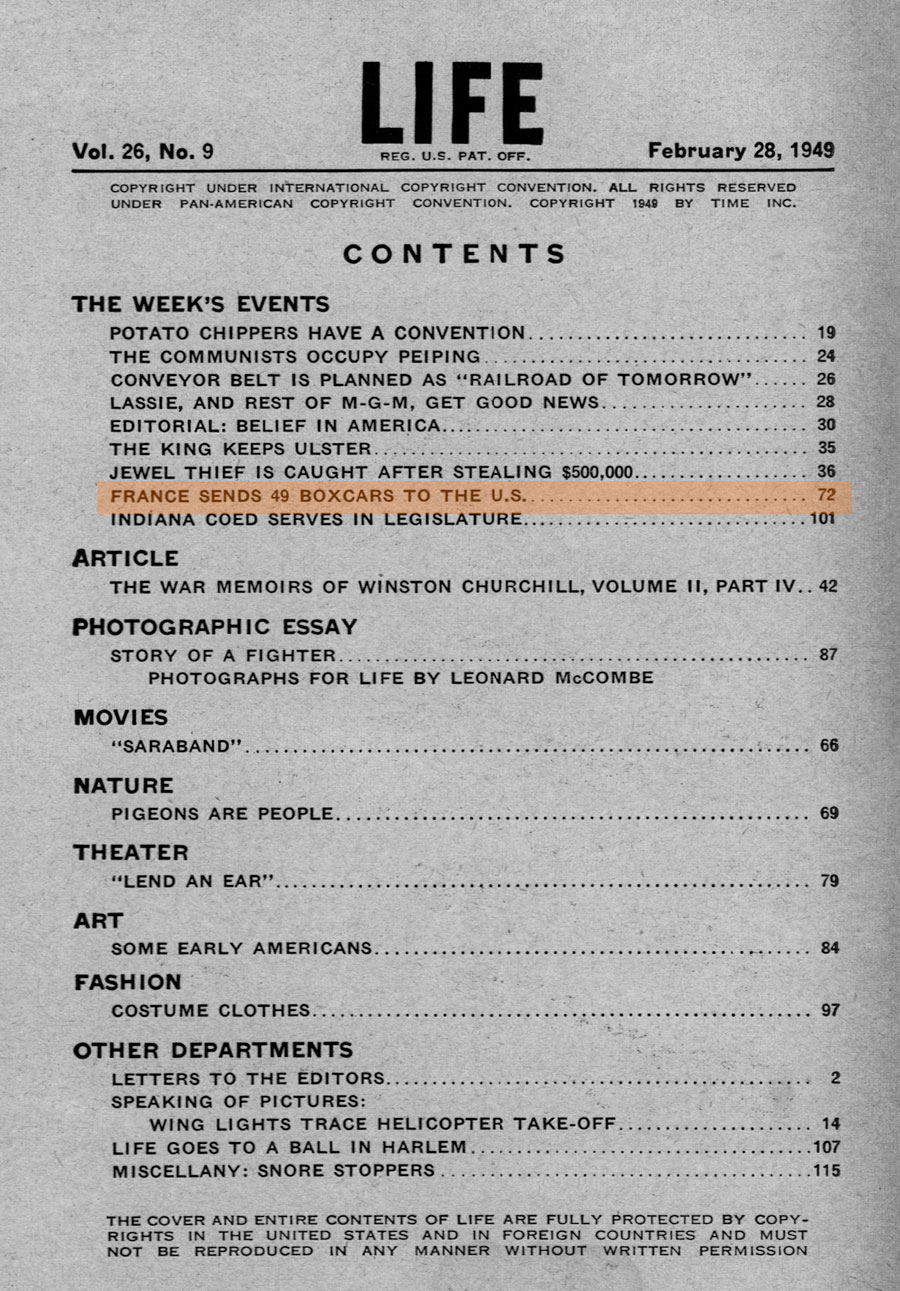
from LIFE Magazine - Feb 1949 / collection

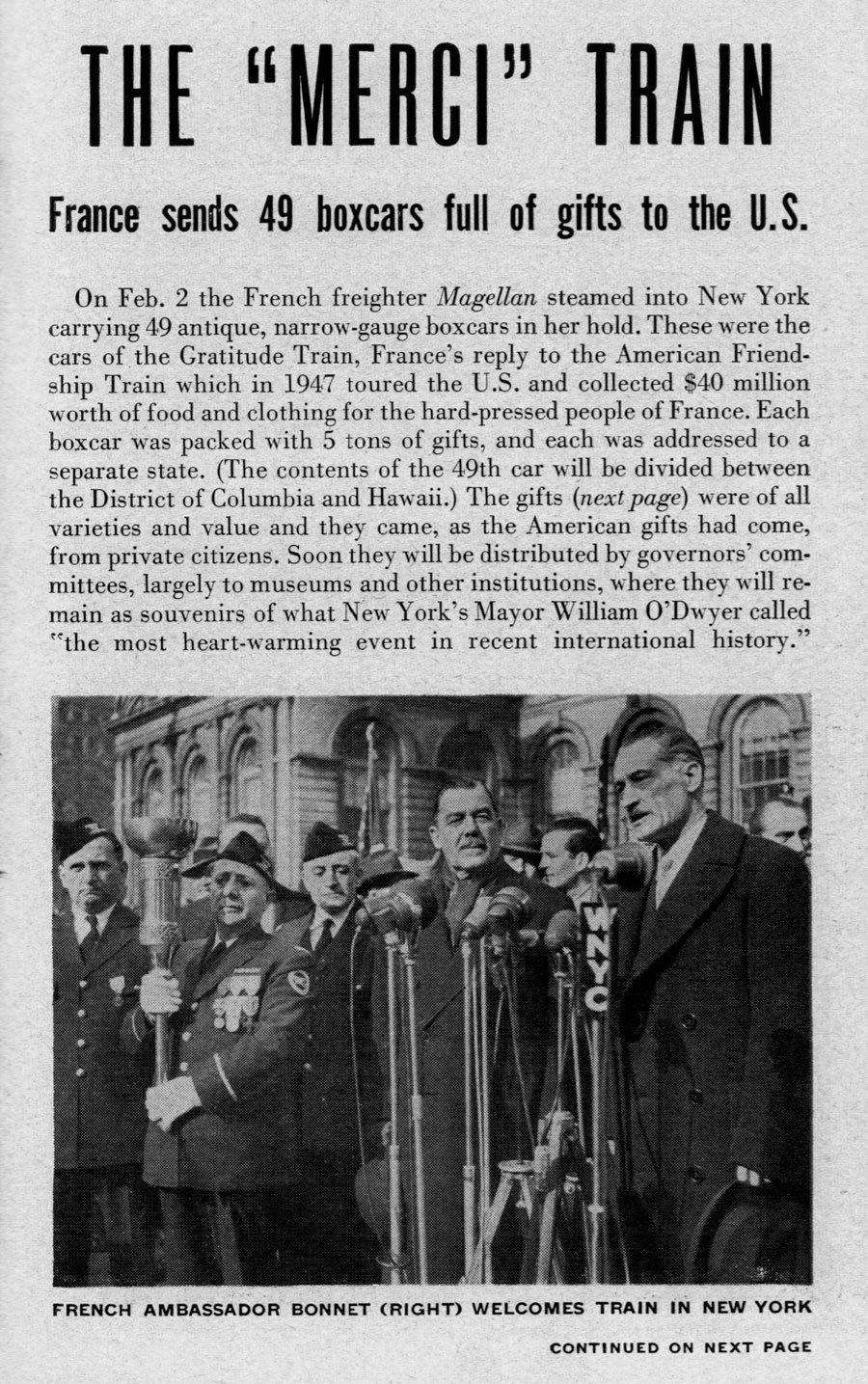
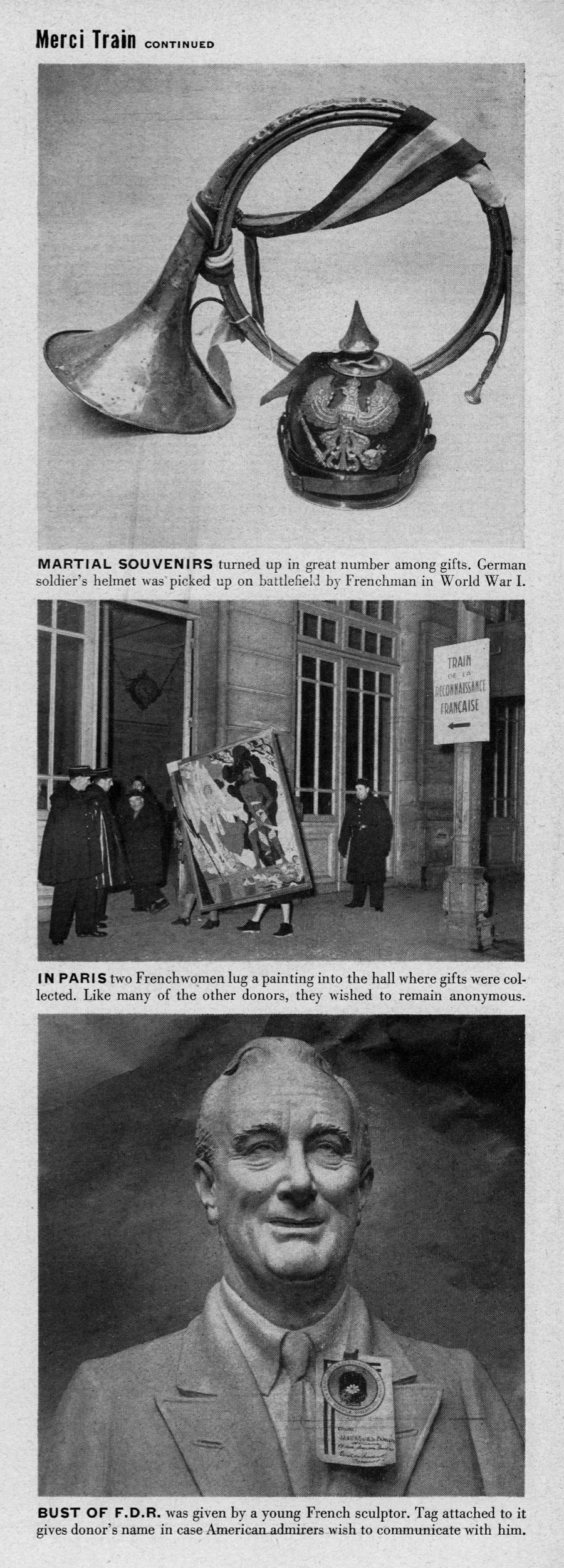
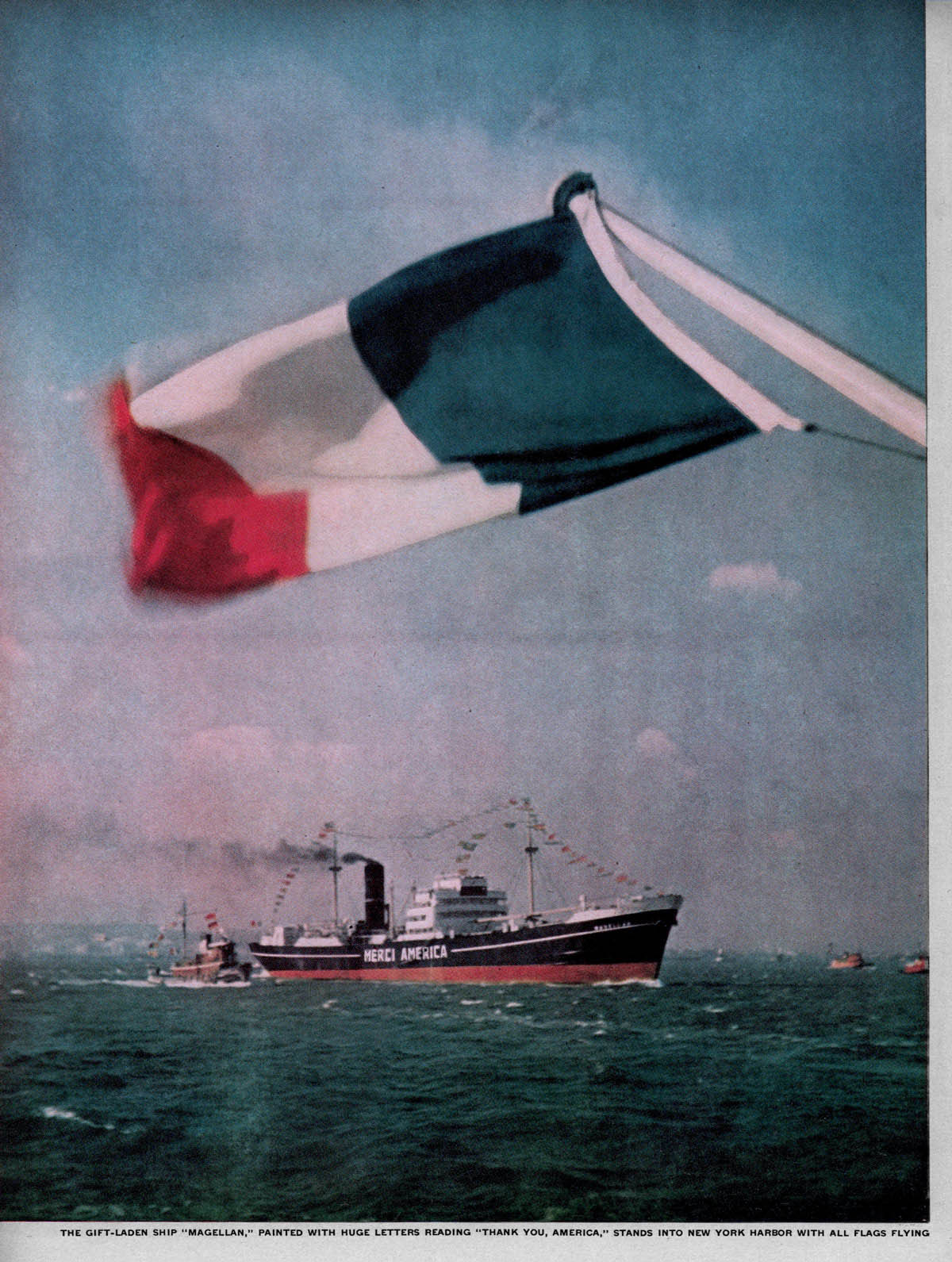
 Georgia
Georgia
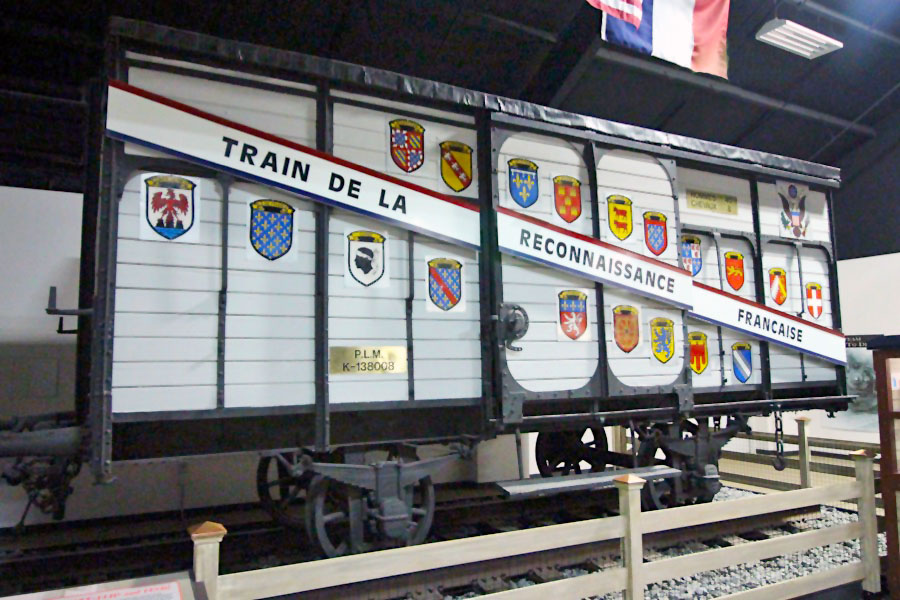
Merci Boxcar #K138008
Kennesaw, Ga / Jun 2019 / RWH
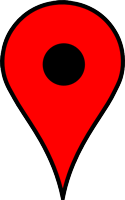 Georgia's Merci Boxcar is displayed indoors at the Southern Museum of Civil War & Locomotive History in Kennesaw. Gifts sent from France in the car are held at the Georgia State Archives.
Georgia's Merci Boxcar is displayed indoors at the Southern Museum of Civil War & Locomotive History in Kennesaw. Gifts sent from France in the car are held at the Georgia State Archives.
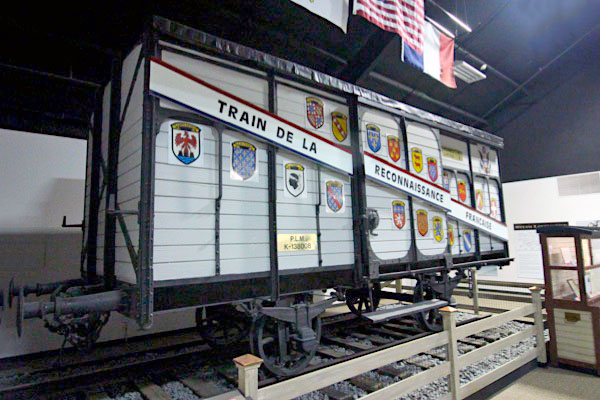
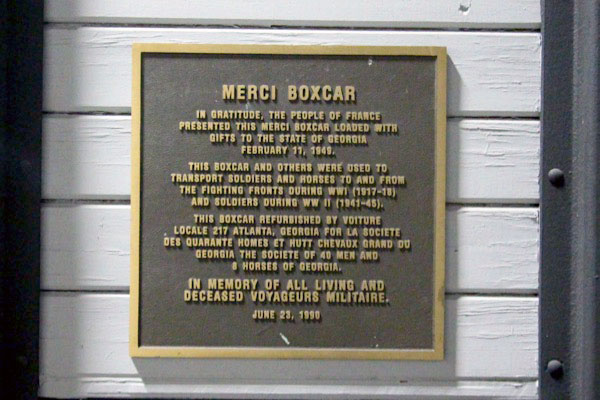
Jun 2019 / RWH

In gratitude, the people of France presented this Merci Boxcar loaded with gifts to the State of Georgia, February 11, 1949. This boxcar and others were used to transport soldiers and horses to and from the fighting fronts during WWI and soldiers during WWII.
Merci Boxcar plaque
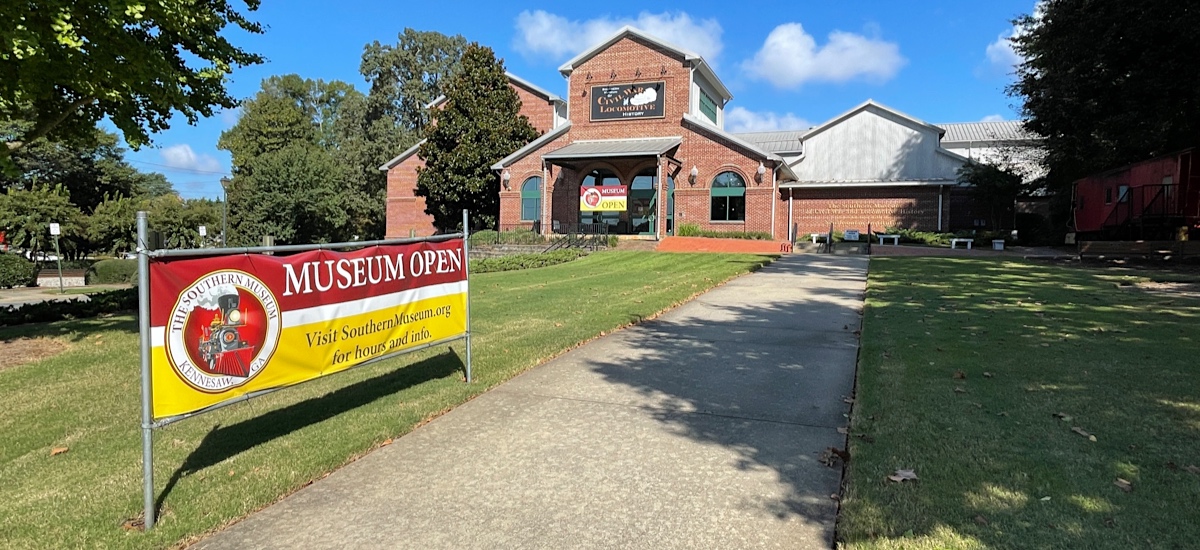
Kennesaw, Ga / Jun 2019 / RWH

Kennesaw, Ga / Jun 2019 / RWH

See also our complete Southern Museum of Civil War & Locomotive History scrapbook in Preservation
 Maryland
Maryland
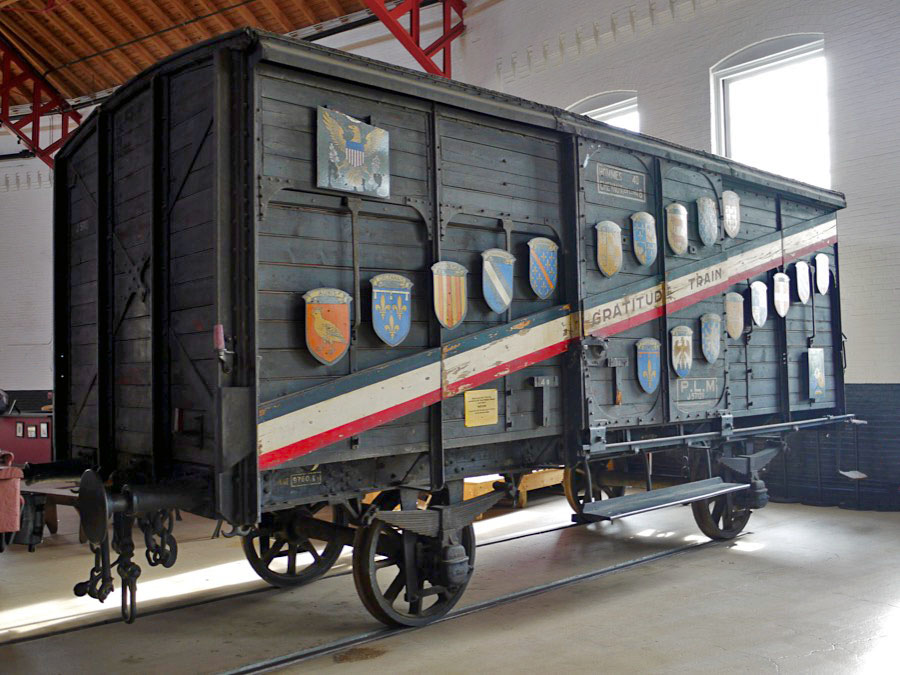
Merci Boxcar #J57121
Baltimore, Md / collection
 Maryland's Merci Boxcar is displayed indoors at the Baltimore & Ohio Railroad Museum in Baltimore. Gifts sent from France in the car are held by the Montgomery County Historical Society.
Maryland's Merci Boxcar is displayed indoors at the Baltimore & Ohio Railroad Museum in Baltimore. Gifts sent from France in the car are held by the Montgomery County Historical Society.
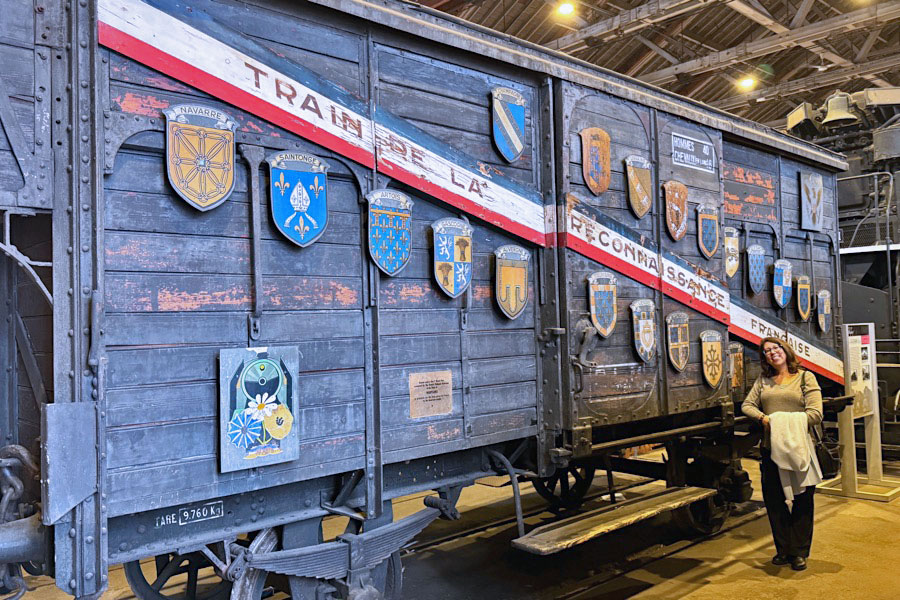
Baltimore, Md / Dec 2024 / RWH
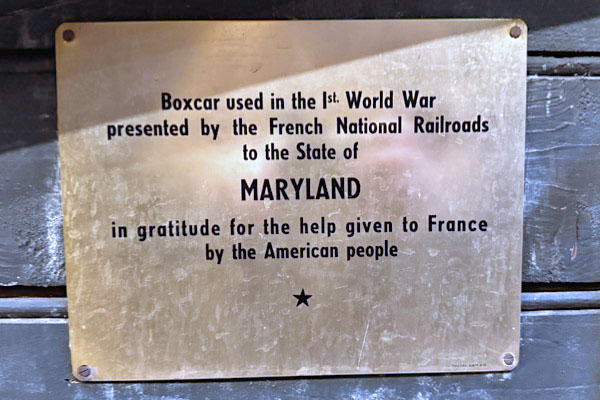
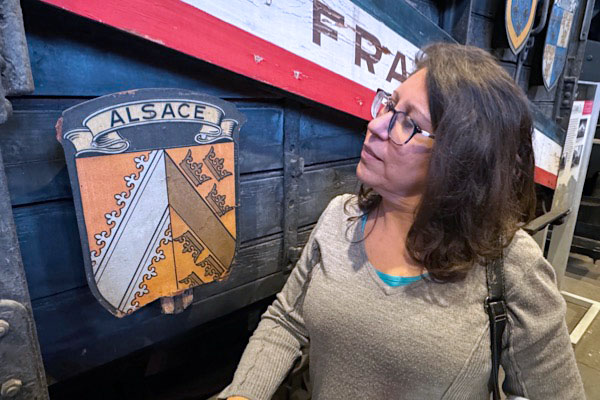
Dec 2024 / RWH
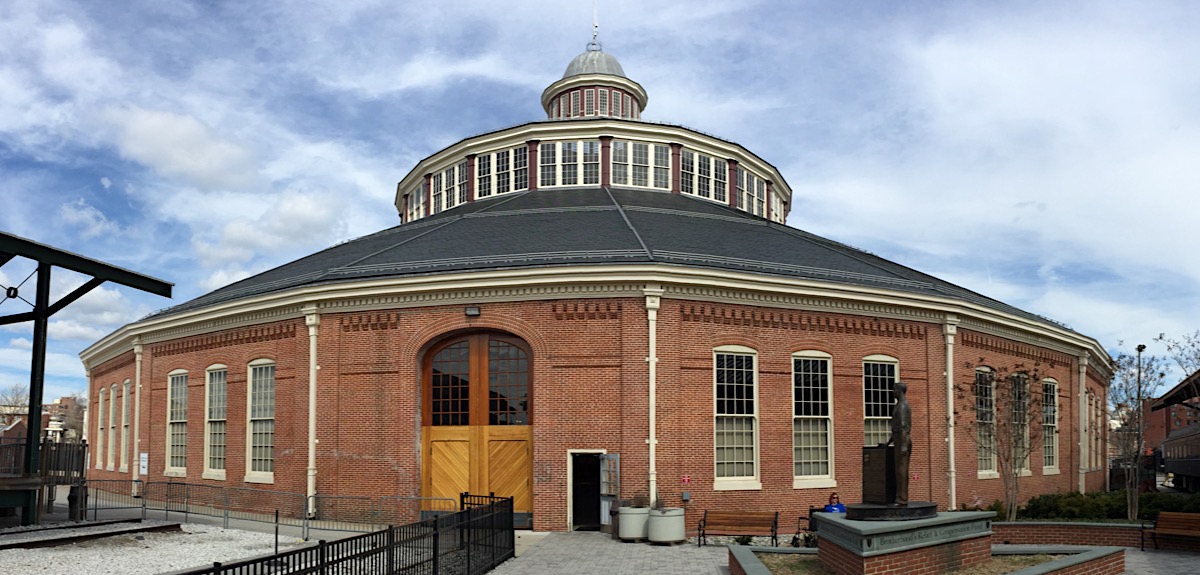
Baltimore, Md / Dec 2024 / RWH
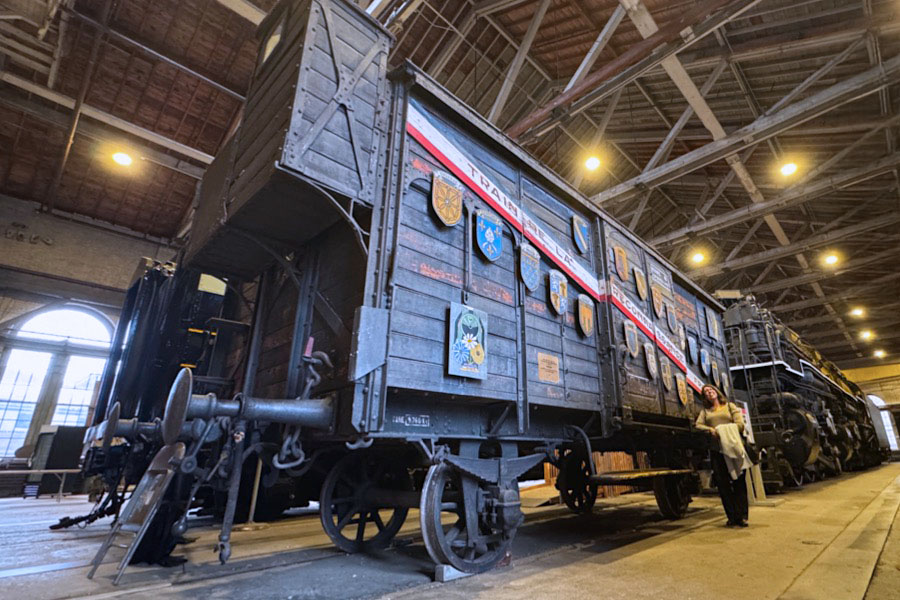
Baltimore, Md / Dec 2024 / RWH

See also our complete Baltimore & Ohio Railroad Museum featured scrapbook in Preservation
 North Carolina
North Carolina
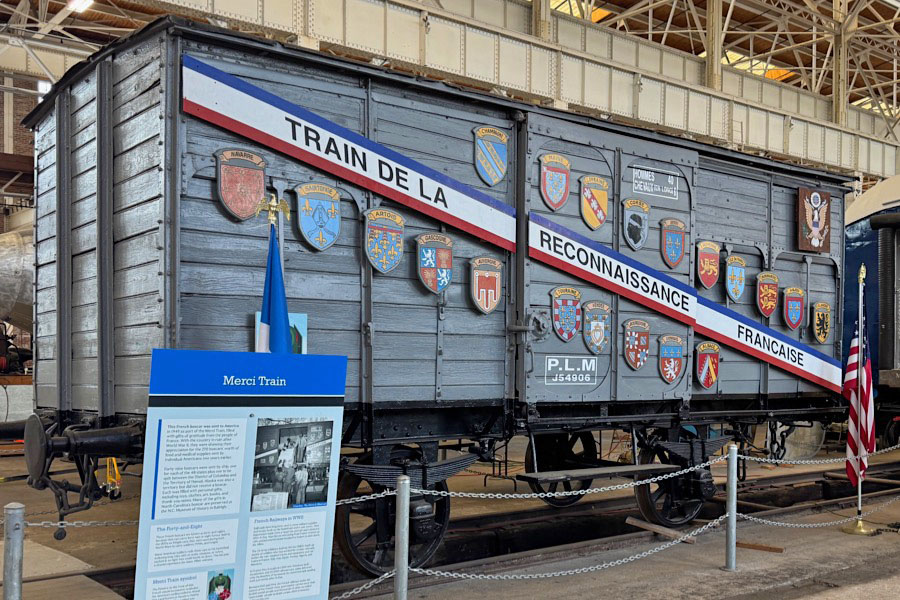
Merci Boxcar #J54906
Spencer, NC / Apr 2025 / RWH
 North Carolina's Merci Boxcar is displayed indoors at the North Carolina Transportation Museum in Spencer. Gifts sent from France in the car are held at the North Carolina History Museum.
North Carolina's Merci Boxcar is displayed indoors at the North Carolina Transportation Museum in Spencer. Gifts sent from France in the car are held at the North Carolina History Museum.
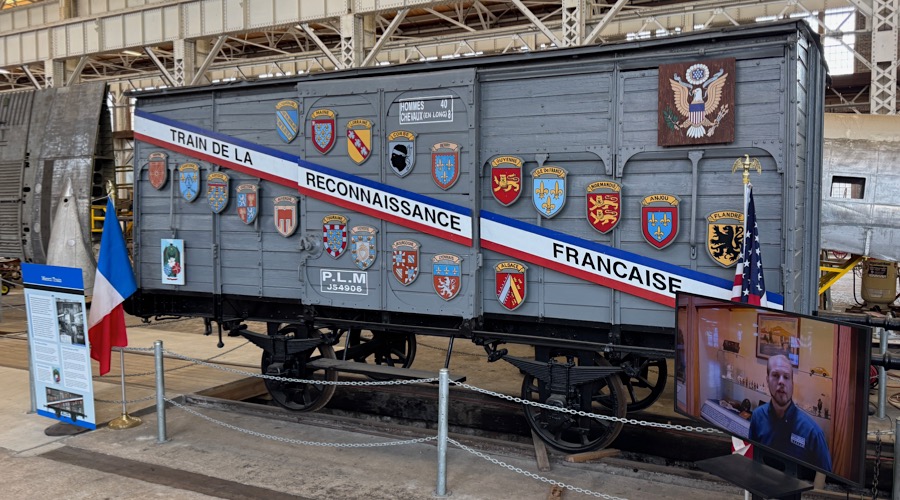
Spencer, NC / Apr 2025 / RWH
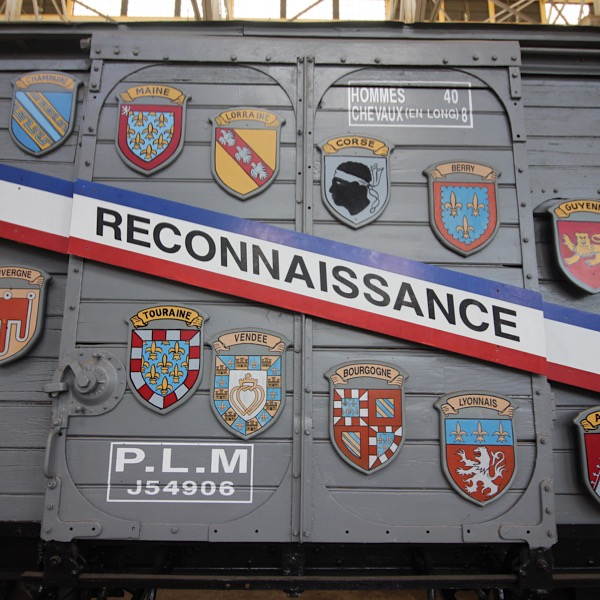
Apr 2025 / RWH
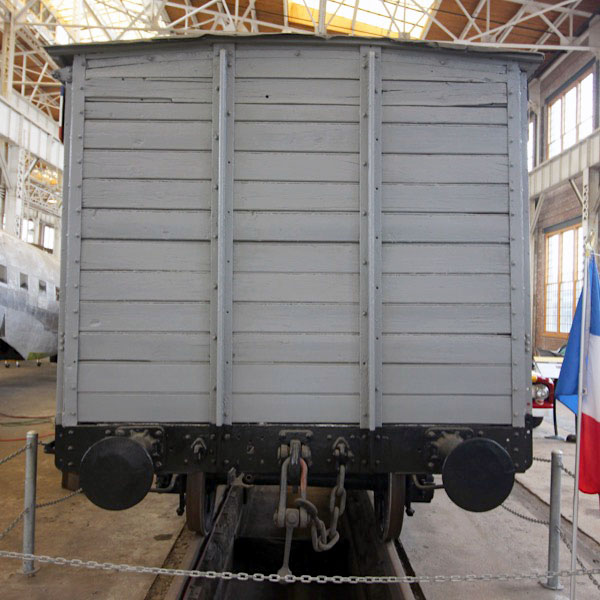
Apr 2025 / RWH
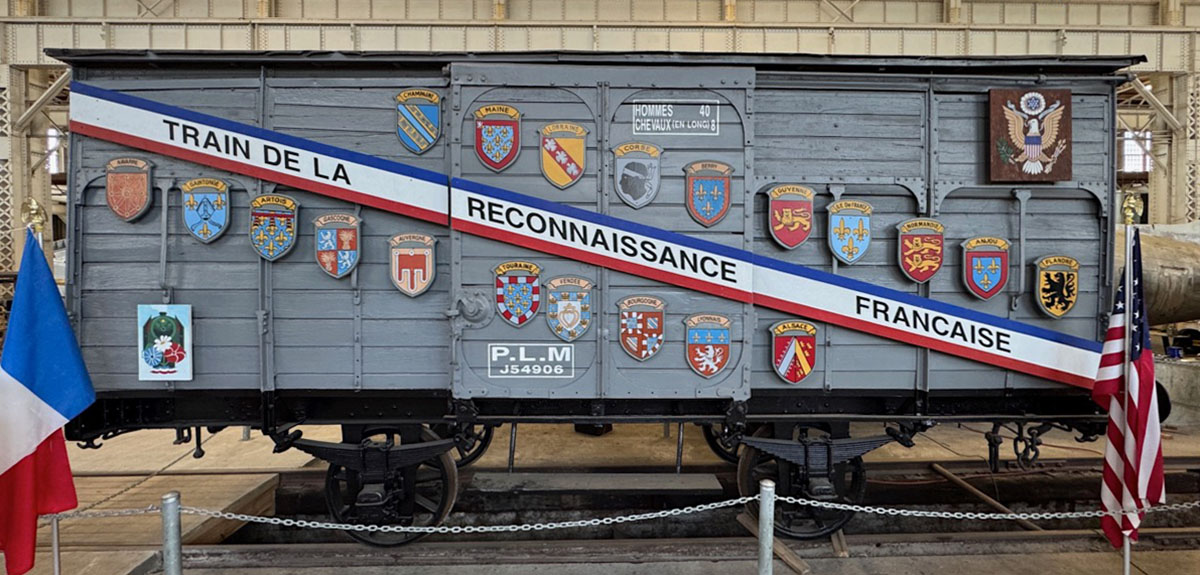
Spencer, NC / Apr 2025 / RWH
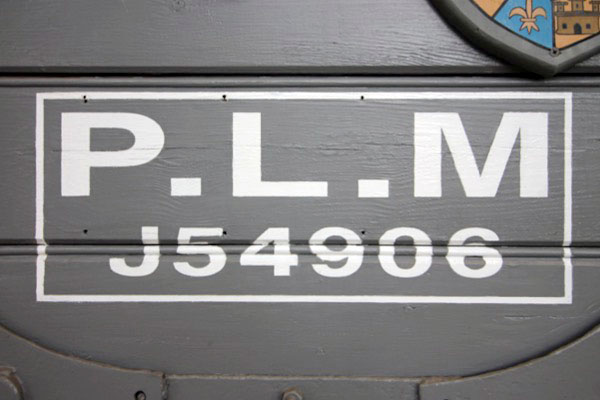
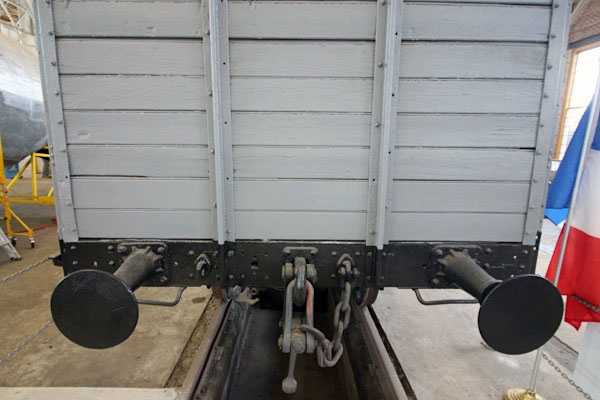
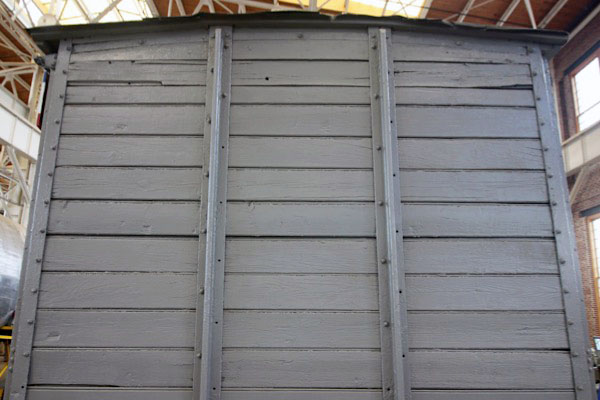
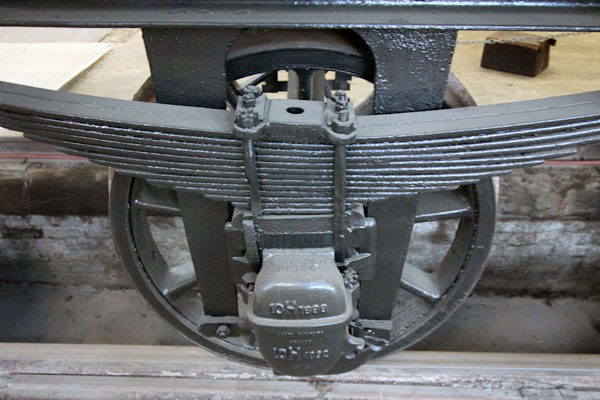
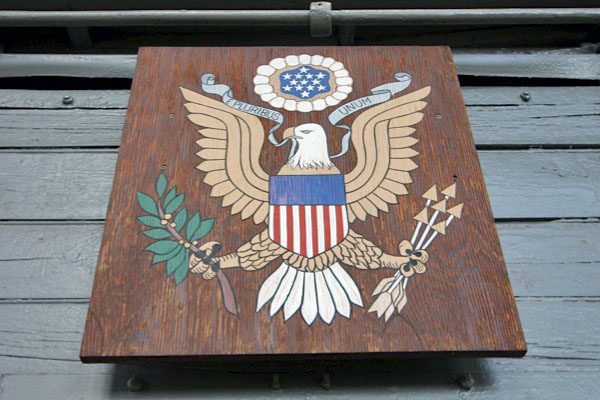
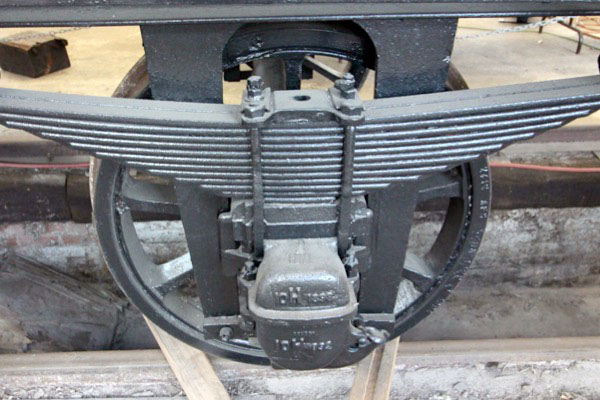
Apr 2025 / RWH
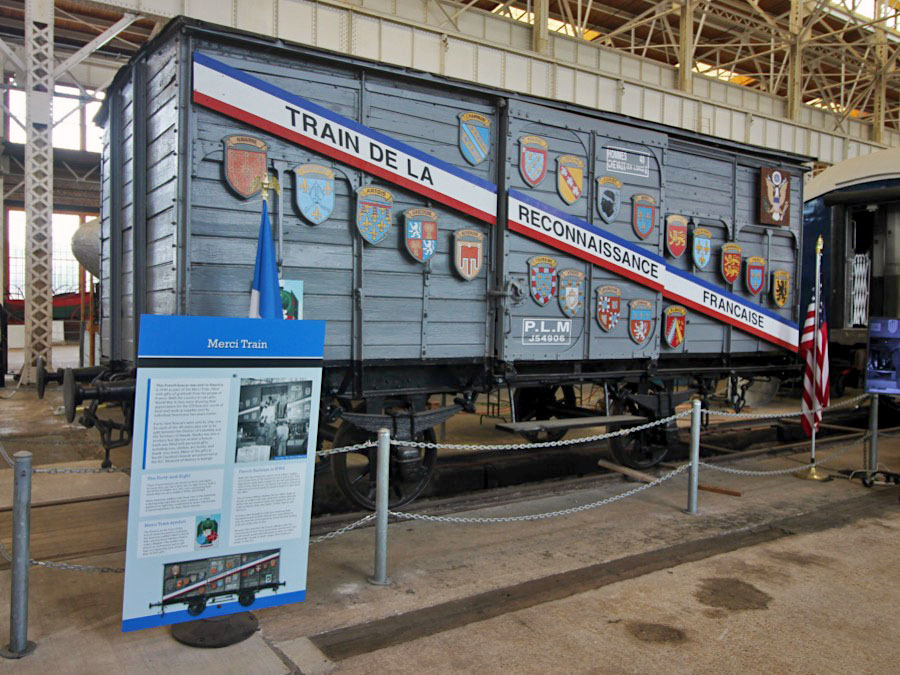
Spencer, NC / Apr 2025 / RWH
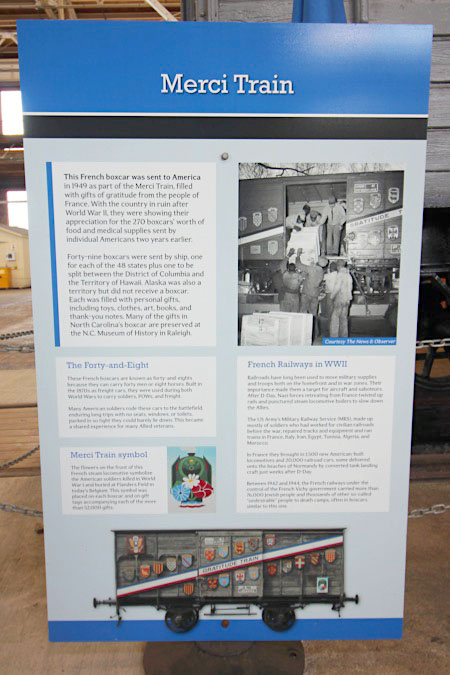
Apr 2025 / RWH
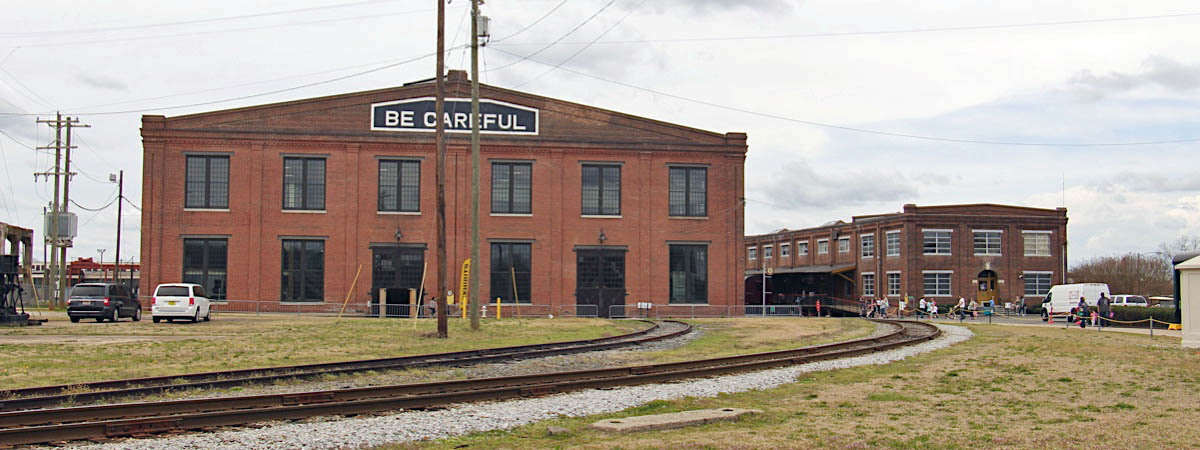
Spencer, NC / Apr 2025 / RWH
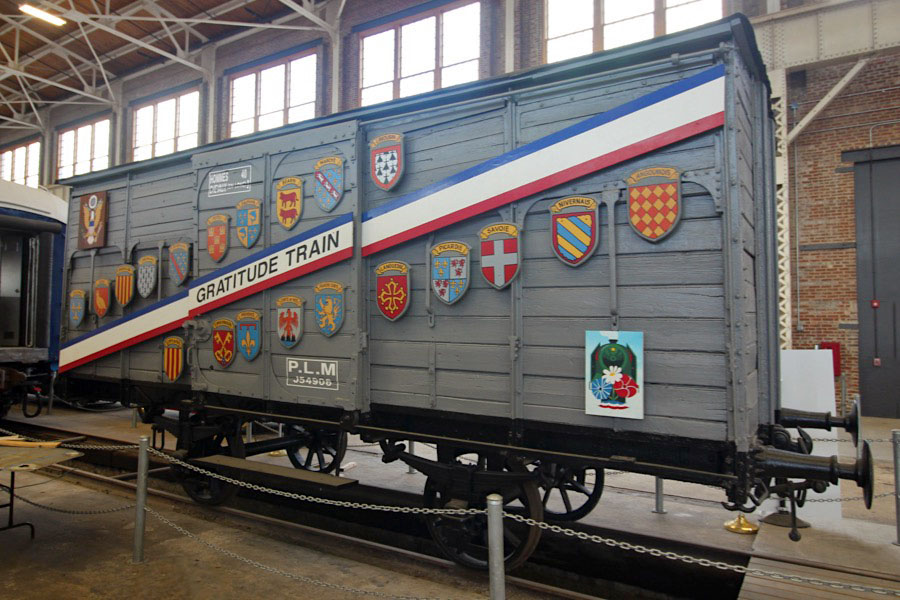
Spencer, NC / Apr 2025 / RWH
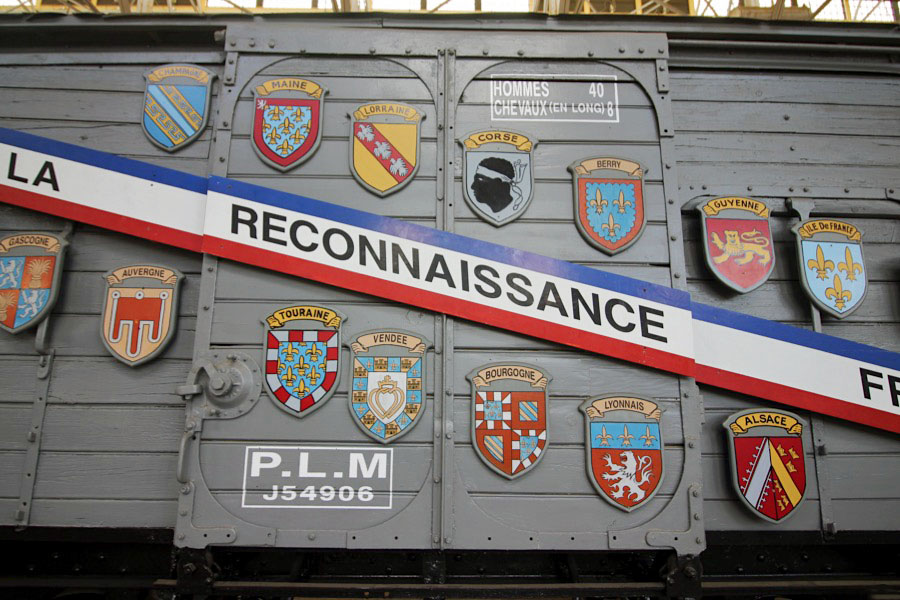
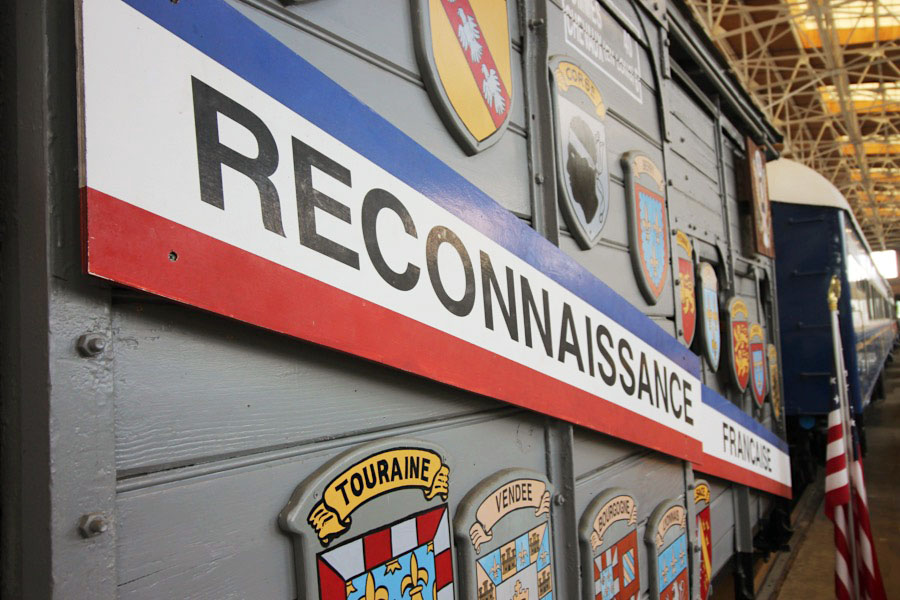
Apr 2025 / RWH

See also our complete North Carolina Transportation Museum featured scrapbook in Preservation
 Tennessee
Tennessee
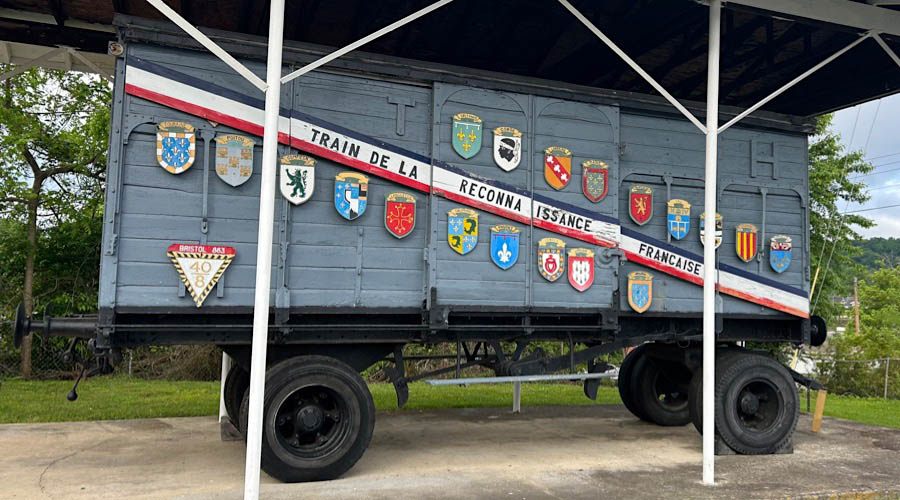
Merci Boxcar
Bristol, Tn / May 2025 / ETH
 Tennessee's Merci Boxcar is displayed outdoors at American Legion Post 145 in Bristol. The car's railway undercarriage has been removed and rubber road tires have been added for use in parades, etc. Gifts sent from France in the car are held at the Tennessee State Museum in Nashville.
Tennessee's Merci Boxcar is displayed outdoors at American Legion Post 145 in Bristol. The car's railway undercarriage has been removed and rubber road tires have been added for use in parades, etc. Gifts sent from France in the car are held at the Tennessee State Museum in Nashville.

Click to see the American Legion Post 145 plotted on a Google Maps page
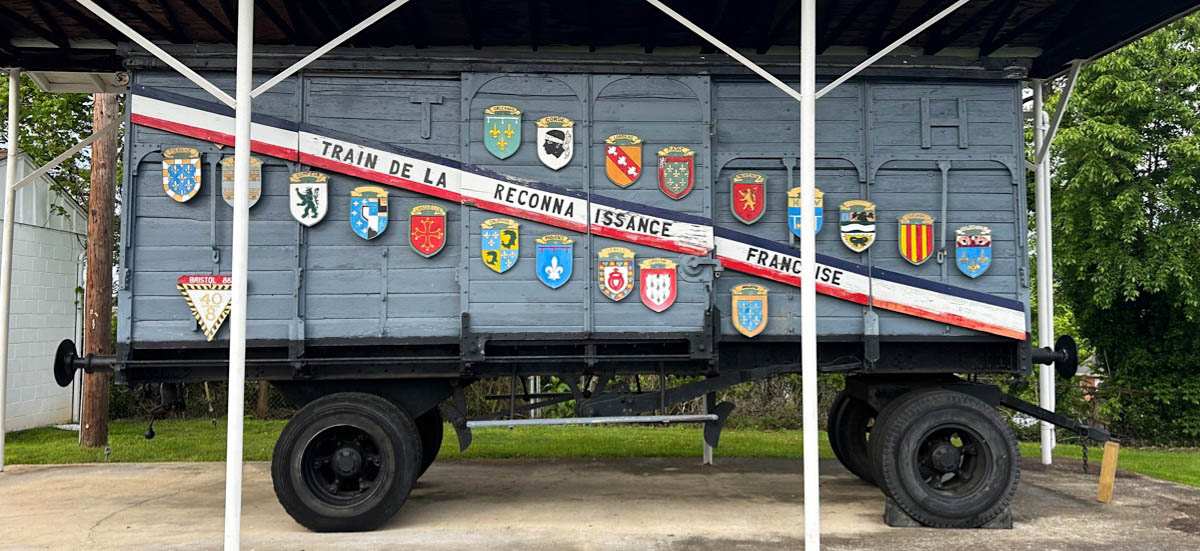
Bristol, Tn / May 2025 / ETH
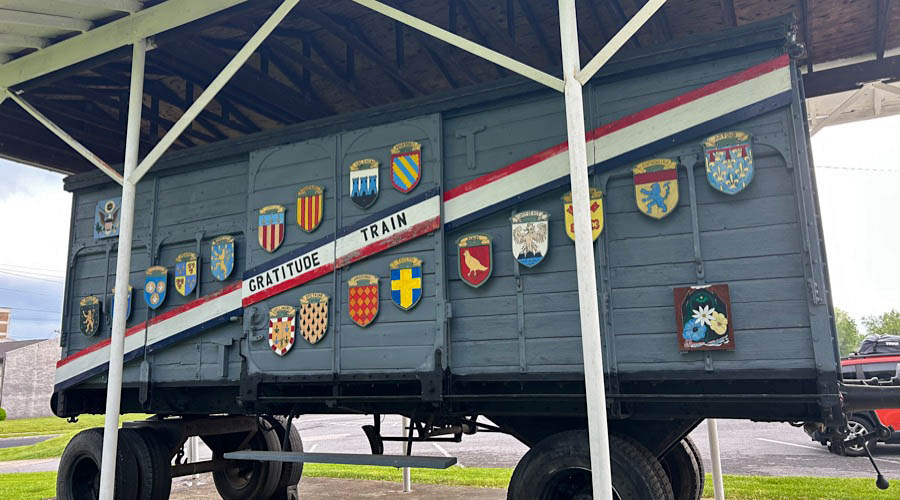
Bristol, Tn / May 2025 / ETH
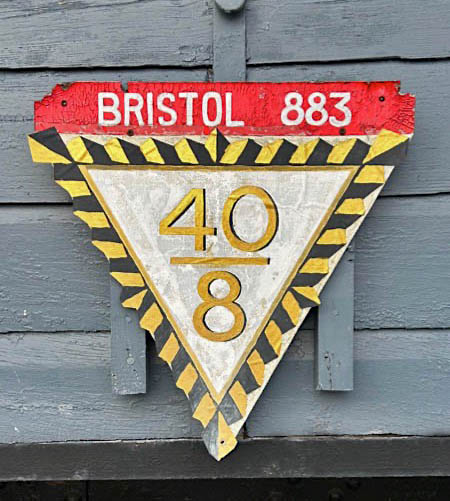
May 2025 / ETH

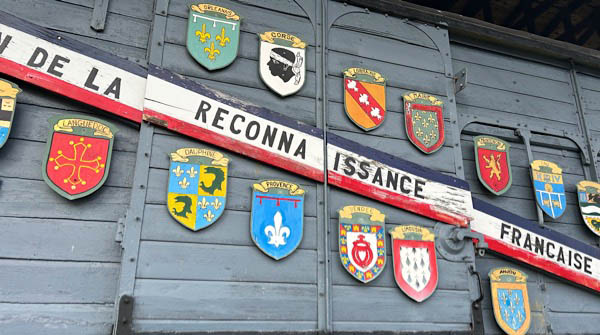
May 2025 / ETH

May 2025 / ETH
 Snapshots
Snapshots

Baltimore, Md / Dec 2024 / RWH
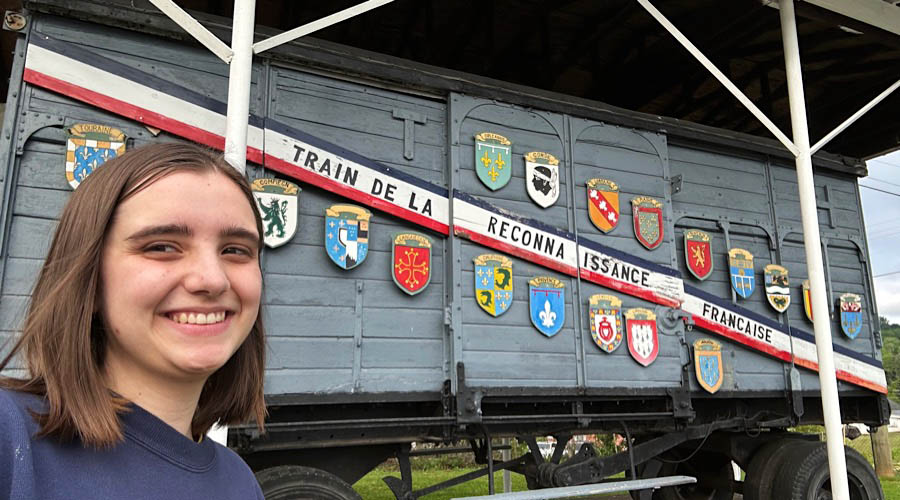
Bristol, Tn / May 2025 / ETH
Links / Sources
- MerciTrain.org website
- Wikipedia article for Merci Train
- Historical Marker Database Merci Train markers
- The Society of Forty Men and Eight Horses website
- The Merci Train: Remembering the World Wars in 52,000 Objects by Ludivine Broch
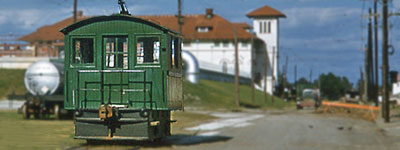
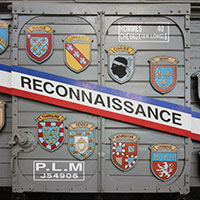
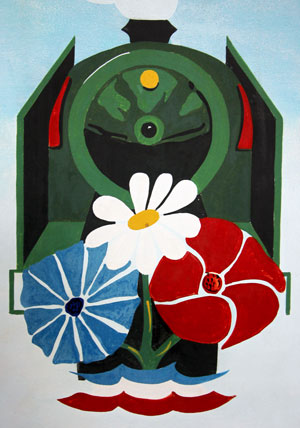
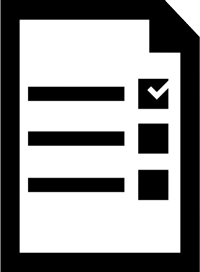 All time Merci Boxcar location roster
All time Merci Boxcar location roster
